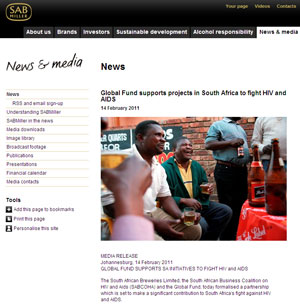Say South African health experts:
Global Fund SAB tie is extremely problematic
South African Breweries and the Global Fund has formalised a partnership to fight against HIV and AIDS. "This arrangement is extremely problematic and is in our view, completely unacceptable" say health experts pointing to conflict of interest, lack of evidence base and questionable quality of programme.
In February The South African Breweries Limited (SAB) announced that the company, the South African Business Coalition on HIV and Aids (SABCOHA) and the Global Fund, had formalised a partnership to fight against HIV and AIDS.
 According to SAB media release the The Global Fund will finance five initiatives relating to HIV/Aids under the Global Fund Workplace Programme through a contribution of over 36 million South African Rand (five million US Dollars) . These initiatives are:
According to SAB media release the The Global Fund will finance five initiatives relating to HIV/Aids under the Global Fund Workplace Programme through a contribution of over 36 million South African Rand (five million US Dollars) . These initiatives are:
- Project Promote, a public private partnership to assist in reaching government condom distribution targets,
- BizAIDS, helping micro and small sized companies protect their businesses from threats such as HIV and AIDS,
- Peer Educator Training and Support, HIV and AIDS Counselling and Testing
- SAB's Tavern Intervention Programme for Men (TIP).
SAB is also a strategic partner in Project Promote, using its existing infrastructure, namely depots and truck drivers delivering stock to outlets, to deliver condoms to taverns.
Controversy
In a open letter to the Global Fund South African health experts request that the recent allocation of funds to support the South African Breweries’ (SAB) Tavern Intervention Programme be seriously reconsidered as a matter of urgency. Terming the arrangement "extremely problematic" and "in our view, completely unacceptable" the experts point to the following reasons:
2. SAB programmes are typically not evidence based and are not properly targeted or evaluated
Reviewing the full range of SAB LTD’s alcohol-abuse programmes it is clear the majority are not based on globally accepted evidence, few target the most at-risk population and few of the interventions are evaluated for effectiveness. The mass media campaigns on responsible drinking which they support (at far higher cost than the Taverner Intervention Programme (TIP)) indicate to consumers that the only people who should not abuse alcohol are teenagers, drivers and pregnant women, which completely ignores the main alcohol-related harms in South Africa (HIV/AIDS, TB, Violence, Pedestrian injuries, mental illness). Furthermore, following the example of Big Tobacco (who are in fact the majority shareholders of SAB Miller) SAB Ltd has actively lobbied government in opposition to proposals to reduce access to alcohol, despite the wealth of global evidence that these measures are the most cost-effective way in which to decrease alcohol abuse. Their lack of support for these measures, which would decrease sales of SAB products, is not particularly surprising given the inherent conflict of interest. It is likely that SAB would ideally like to increase sales without increasing alcohol-related harm, unfortunately this scenario is not possible, as demonstrated by the global evidence which shows unequivocally that per capita consumption levels are closely linked with rates of alcohol-related harms, particularly in contexts like our own, where we have high rates of risky drinking (approximately 30% of drinkers).
RELATED ARTICLES
- New report highlights benefits of policy measures to prevent harmful alcohol consumption
- Alcohol use - a barrier to health and to the achievement of the SDGs
- Government investments in alcohol industry up against the wall
- Abstracts for GAPC 2020 – deadline 29 July 2019
- A regional African alcohol coordination mechanism is needed
- New book reveals a series of unethical business practices by Heineken in Africa
- SAAPA applauds WHO position on no industry collaboration
- Next GAPC to be held in Dublin in March 2020
- SAFER – a new WHO initiative to boost national alcohol policy processes
- Trouble Brewing

